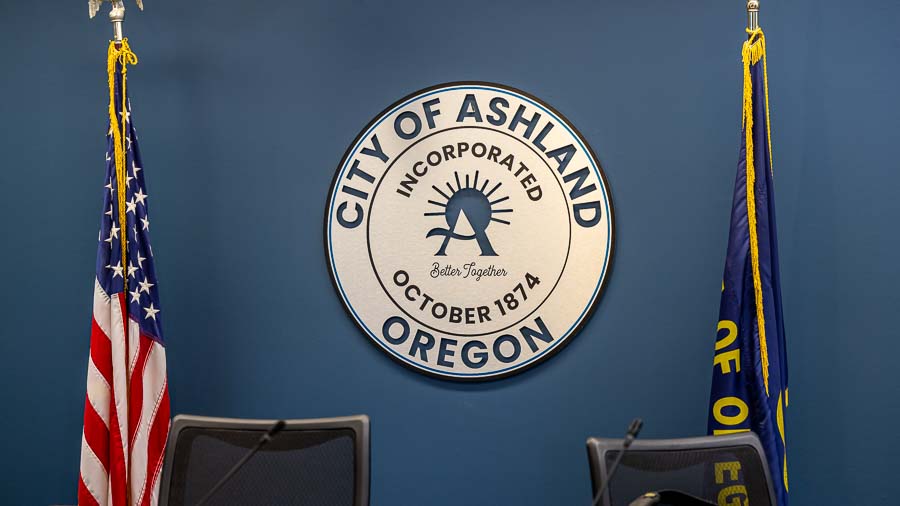Plan would reduce fire risk for 90% of city properties, proposed development would add affordable housing
Ashland.news staff report
The Ashland City Council will consider adopting a new plan to lower the city’s chances of catastrophic wildfire during its regular business meeting on Tuesday, Aug. 19.
Reviewed during a City Council study session last month, the 400-page document is aimed at decreasing wildfire risks for 90% of the city’s homes, businesses, and buildings amid climate change, rising fire risk, increased summer smoke, and a mounting insurability crisis.
The proposed plan outlines a 10-year roadmap to boost wildfire readiness through reducing combustible fuels on public and private landscapes, revising the city’s municipal codes to align to reduce fire risk for 90% properties, community education, and wildfire readiness support for financially vulnerable populations.
According to a city business item report, the council’s adoption of the plan carries no immediate cost to the city. However, implementing the protection plan would require an estimated $80 to 100 million over 10 years. City officials point out in the report that the cost would be shared “at all levels, from individuals, rental property owners, local government, state government, federal government, non-profits, foundations, businesses, and institutions.”
According to the report, the wildfire reduction fee — which was increased to $7 per month earlier this year on water bills— positions Ashland to leverage state and federal grants by allowing the city to receive matching dollars from outside agencies.
Grand Terrace apartments
City officials will review a proposal to annex a project north of town that would include a more than 200-unit apartment complex along Highway 99 into city limits, dubbed the Grand Terrace apartments.
If approved, the development would expand the city’s affordable housing options. Tuesday’s review will be the first reading of the proposed ordinance, according to the meeting agenda.
Meeting materials noted that the Ashland Planning Commission has approved the project three times since 2020. State law changes have delayed the project. However, according to the project’s application, a legislative update to required minimum parking requirements and the size of affordable housing units has allowed the project developers to clear the legal hurdles.
The updated proposal will include 10 fire-resistant, solar-powered buildings, a “transit plaza,” with bike and pedestrian improvements and stormwater systems. The apartments will be one-bedroom units — 24 will qualify as affordable housing, for households that earn 80% of the area’s median income.
SOU master plan update
City officials are expected to finalize updates to Southern Oregon University’s Facilities Master Plan, which will align Ashland’s zoning, development codes, and planning documents with the university to support campus growth and potential sale of SOU property as the university moves to address its financial woes.
Emergency shelter construction
City officials are expected to vote on a nearly $1 million contract amendment to upgrade Ashland’s emergency shelter into a year-round facility for those experiencing homelessness. The project is part of the city’s effort to update the site, located on Ashland Street, into a modern facility to offer shelter to people during inclement weather.
The city will consider an alternate plan that would add heating and cooling for the garage area that would add more than $60,000 to the cost, or a different plan that would add more than $30,000. If both are approved, this would increase the cost to nearly $1 million, according to meeting materials.
Monday study session
During Monday’s study session, representatives from the Ashland Fiber Network will seek more than $700,000 from city officials to expand high-speed internet, using a hybrid strategy that would encompass standard cable upgrades and fiber, according to meeting materials.
Meeting materials note that Ashland’s municipally owned broadband utility kicked off a project in 2023 to bring fiber to residential areas, with more than 500 homes connected. Staff note that it would cost the city $15 million to fully install the high-speed fiber, the meeting documents note.
Monday’s study session starts at 5:30 p.m., Tuesday’s business meeting at 6 p.m. Meetings are held in the Ashland City Council chamber at 1175 E. Main St. Proceedings are cablecast live on Channel 9 (or 180), streamed online at rvtv.sou.edu (RVTV Prime), and posted online the day after the meeting.
Email Ashland.news associate editor Steve Mitchell at [email protected].



















